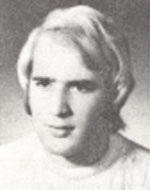Ozna, Barto
Barto, son of Simi and Yehuda, was born in Marrakesh, Morocco, in 1947 and immigrated to Israel with his family in 1962. He completed his studies in an elementary school in Morocco and then studied for a year at the yeshiva of the city’s rabbi. Berto was one of the best students in the school. He was a naughty boy, full of energy, yet understanding and kind. He loved Torah study in his yeshiva. At the age of 15, Berto was a member of a Zionist movement that helped Moroccan Jews immigrate to Israel. He was the one who suggested that the family immigrate to Israel. With his help they obtained all the necessary documents. When his family immigrated to Israel, his economic situation was difficult and Barto joined the “Youth Watch” of the Youth Aliyah. He studied and worked there and enjoyed life in the farm, the field and the animals. Barto was a sports fan and every week he watched the matches of his favorite team, Maccabi. Berto loved life and tried to make the most of it. He accepted everything in good spirits. He had a sense of humor and liked to play, joke, and laugh. He loved nature and was the editor of many trips and picnics around the country. Berto was not ambitious, but he always wanted to know more and not live a routine life. According to his friends, he was a good friend and loved to help everyone. He was a good brother and understood his younger brothers. They would consult with him about all their problems and he would try to help, and usually he would find a solution to every problem. Berto was a handsome handsome man, and his black eyes had a penetrating and captivating look. Berto was drafted into the IDF in early November 1964. After completing basic training, after serving in a medium-tank course, he served as a tanker for the Centurion tank in the battalion, and later served as a tanker in the tank. After completing his army service, Berto was assigned to reserve duty, and in the last year before the Yom Kippur War, Engraving, a profession he loved at the Sprinzak School, where he worked as a laborer at the Electric Company, and another Y-Yes in “Vulcan-Metzbarim” and in “Ta’as” as a pen. His wife was a very good husband, understanding and loving. Family life mattered most to him. When his son was born, he was the happiest man. He treated him with great devotion and love and wanted to give him an excellent education in a Simcha family atmosphere. When the Yom Kippur War broke out he waited impatiently for the order of the call, and when he arrived he joined his unit in the Golan Heights. On the 7th of Tishrei 5740 (7.10.1973), during the battle of containment near Hoshenia, east of the oil pipeline, his tank was hit directly and Barto was killed. He was brought to eternal rest in the cemetery in the David camp near Haifa. Survived by a wife, son, parents, four brothers and four sisters. After his fall, he was promoted to sergeant. In a letter of condolence to the bereaved family, the commander of the unit wrote: “He was a good and loyal soldier, he carried out all his duties, and his friends and commanders.” In the booklet “Ella Ezekra,” which was published by the reconnaissance battalion in memory of its fallen soldiers during the Yom Kippur War in the Golan Heights, a list was published about his character; The patrol battalion also set up a monument in Ein Zivan in memory of its fallen soldiers in the war and Berto among them.
